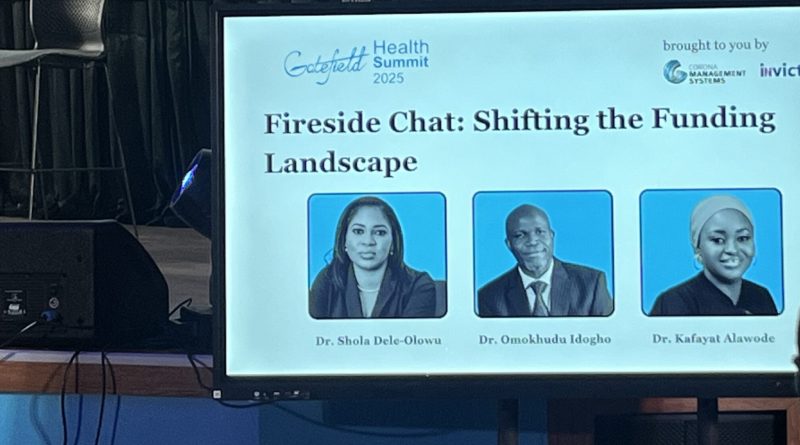Experts urge Nigeria to adopt safety-based funding, community-led innovation for resilient health systems
Health experts have urged the Nigerian government to strengthen domestic resource mobilisation and prioritise safety-based funding as a pathway to building a resilient and self-sustaining health system.
This call was made during a fireside chat at the Gatefield Health Summit 2025, moderated by Kafayat Alawode, Programme Director at Development Governance International Consult (DGI).
The session featured Shola Dele-Olowu, Director of Regional Initiatives at AMP Health, and Anthony Nwala, Assistant Chief Programme Delivery Officer at the Society for Family Health (SFH), who represented the organisation’s Managing Director, Omokhudu Idogho.
Safety-based funding
Speaking on the transition from donor dependence to sustainability, Ms Dele-Olowu said Nigeria must shift from external aid to domestic financing to secure its health system’s future.
She described the current global funding decline as a reminder that donor nations will prioritise their citizens first during crises.
“We cannot continue to depend on external funding to finance our essential services. The transition shock from donor withdrawal has given way to opportunity, and innovation is usually born out of crisis,” she said.
She cited Ghana’s approach after the United States Agency for International Development (USAID) exit, noting that the country raised taxes on sugar and leveraged its gold sector to fund maternal and child health programmes.
According to her, Nigeria must treat this period as a wake-up call to improve fiscal accountability and demonstrate efficient use of available resources.
She also highlighted that innovation should not always be about large-scale projects.
She cited Guyana, a South American country, where health workers now access malaria treatment guidelines through WhatsApp-based AI chatbots, significantly reducing the cost of printing bulky manuals.
Ms Dele-Olowu stressed that human capacity is central to system sustainability, urging long-term investment in health workers and programme staff rather than focusing solely on short-term outputs.
She also emphasised the importance of process innovations, small but effective adjustments that reduce costs, improve efficiency, and strengthen health system resilience.
Intentional domestic resource mobilisation
Speaking on domestic health financing, Mr Idogho said Nigeria’s health sector must deliberately mobilise resources internally and use data to guide spending and policy decisions.
He noted that the scale-back of donor support by agencies led to SFH established subsidiary organisations to diversify income streams and provide technical assistance to governments at multiple levels.
“We must be intentional about internal resource mobilisation. Each time we respond to a crisis, it should become a practice, not an act of desperation,” he said.
He emphasised the need for self-honesty in government financial planning, urging transparent and deliberate use of funds.
Mr Idogho also highlighted that resilience depends on understanding gaps, analysing data, and channelling resources strategically rather than following traditional patterns or spending simply because it has been done that way before.
Empowering communities for sustainable financing
On community ownership, Mr Idogho said it is central to health system resilience.
He cited SFH’s partnerships with transport unions in northern Nigeria to provide emergency transport services for pregnant women, which contributed to a reduction in maternal mortality.
He also referenced initiatives in Delta State, where Nigerians in the diaspora sponsor indigent households through the state’s Contributory Health Scheme, helping to reduce out-of-pocket health expenditure.
Mr Idogho stressed that existing community structures, including traditional leaders, local associations, and volunteer health workers, should be leveraged for awareness creation, health promotion, and service delivery.
He further noted that resilience is about people, not just programmes or funding, and that communities must be empowered to take ownership of health interventions to ensure long-term sustainability.
Gatefield health summit 2025
The Gatefield health summit brought together leaders from government, civil society, academia, and the private sector to discuss strategies for strengthening health systems across Africa.
READ ALSO: Nigerian govt releases N32.9 billion to PHCs, urges Nigerians to monitor funds
Organised by the Gatefield Impact Foundation, the two-day event, holding at Nile University, Abuja, from 22 to 23 October 2025, is focused on improving health resilience through dialogue on chronic diseases, outbreak preparedness, women’s health, antimicrobial resistance (AMR), health financing, and the One Health approach.
The ongoing summit is designed to provide a platform for experts to share experiences, highlight innovative practices, and explore ways to build sustainable, community-driven health systems in the face of dwindling external funding and evolving public health challenges.

